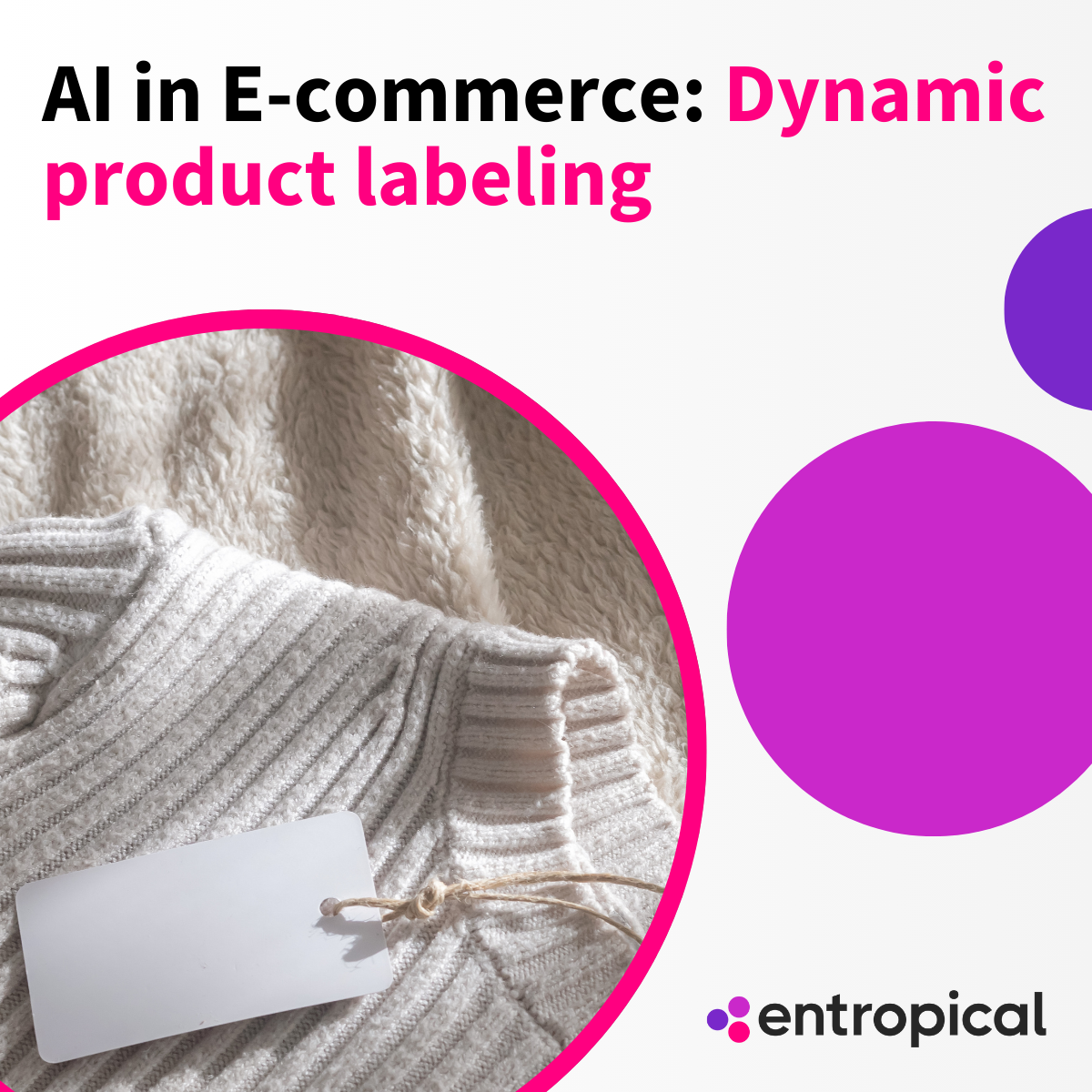
7 AI Applications in E-commerce
7 Powerful AI Applications Transforming E-commerce and Digital Marketing
Beyond Chatbots and Assisted SEO Copywriting
In the fast-paced world of e-commerce and digital marketing, staying ahead of the competition requires more than just the basics. While chatbots and assisted SEO copywriting have become standard tools, there are advanced AI applications that can significantly elevate your business strategies. At Entropical, we’ve been implementing innovative AI solutions that go beyond conventional approaches, delivering impactful results for our clients.
In this blog post, we’ll explore seven powerful AI applications that are transforming the digital marketing landscape.
1. Dynamic Product Enrichment
Automatic, Customizable Labeling of Products Based on Characteristics and Applications
Managing extensive product catalogs can be a daunting task for e-commerce businesses. Dynamic product enrichment utilizes AI to automatically analyze and label products based on their features, characteristics, and potential applications. This process enhances product discoverability and improves the customer shopping experience.
Benefits:
- Improved Searchability: Accurate and detailed labels make it easier for customers to find products through search functions and filters.
- Efficient Inventory Management: Automated labeling reduces manual effort and minimizes errors in product categorization.
- Personalized Recommendations: Enriched product data enables more precise product recommendations for customers.
Example: An AI system scans product descriptions and images to tag a new line of athletic shoes with labels like “running,” “breathable material,” and “trail running.” Customers searching for trail running shoes will easily find these products, enhancing their shopping experience.
2. Behavioral Profile Categorization
Advanced User Labeling Based on Complex Interaction Patterns
Understanding customer behavior is crucial for effective marketing. Behavioral profile categorization employs AI to analyze complex interaction patterns, such as browsing habits, purchase history, and engagement levels, to create detailed customer profiles.
Benefits:
- Targeted Marketing Campaigns: Tailor marketing efforts based on specific customer segments.
- Enhanced Personalization: Deliver personalized content and offers that resonate with individual customers.
- Improved Customer Retention: Anticipate customer needs and preferences to foster loyalty.
Example: AI algorithms identify a group of customers who frequently purchase eco-friendly products. This segment can then be targeted with marketing campaigns highlighting sustainable product lines, increasing the likelihood of engagement and sales.
3. Explained Product Recommendations
AI That Doesn’t Just Suggest—It Tells You Why It’s Relevant
Traditional recommendation engines often lack transparency, leaving customers wondering why certain products are suggested. Explained product recommendations provide context, enhancing trust and encouraging engagement.
Benefits:
- Increased Trust: Customers are more likely to consider recommendations when they understand the rationale behind them.
- Enhanced Customer Experience: Personalized explanations make the shopping experience feel more tailored and considerate.
- Higher Conversion Rates: Relevant recommendations with explanations can lead to increased sales.
Example:
- “Based on your interest in Italian cooking, you might enjoy our selection of gourmet pasta sauces.”
By connecting the recommendation to the customer’s interests, the AI makes the suggestion more appealing.
4. Micro-Campaign Automation
Behavior-Triggered, Tailored 1:1 Cross-Channel Campaigns
Micro-campaign automation leverages AI to create highly personalized marketing campaigns triggered by specific customer behaviors. These campaigns are delivered across multiple channels, ensuring consistent and timely communication.
Benefits:
- Real-Time Engagement: Respond to customer actions instantly with relevant content.
- Cross-Channel Consistency: Deliver a unified message across email, social media, SMS, and more.
- Increased ROI: Personalized campaigns often result in higher engagement and conversion rates.
Example: A customer adds items to their cart but doesn’t complete the purchase. The AI system triggers a personalized email offering a special discount, followed by a reminder on social media, encouraging the customer to return and complete the transaction.
5. Smart Buying Assistance
Converting a Few Strategic Questions into Precise Product Matches and Profile Enrichment
Smart buying assistance involves AI-powered virtual assistants that interact with customers to identify their needs through strategic questions. This not only helps in providing precise product recommendations but also enriches customer profiles for future interactions.
Benefits:
- Enhanced Customer Support: Provide immediate assistance, improving customer satisfaction.
- Profile Enrichment: Collect valuable data to refine future marketing efforts.
- Streamlined Purchasing Process: Help customers find what they need quickly, reducing decision fatigue.
Example: A “buying guide” module about their preferred style, budget, and occasion for purchasing a new outfit. Based on the responses, the AI suggests suitable products and updates the customer’s profile with this information for future personalization.
6. Dynamic Product Copy
Content That Adapts to User Profiles and Behavioral Triggers
Dynamic product copy uses AI to generate and adapt product descriptions and promotional content based on individual user profiles and behaviors. Incorporating psychological principles, such as Cialdini’s principles of persuasion, this approach aims to increase engagement and conversion rates.
Benefits:
- Personalized Messaging: Craft messages that resonate with individual customers.
- Increased Engagement: Relevant content captures attention and encourages interaction.
- Higher Conversion Rates: Persuasive copy can influence purchasing decisions.
Example: For a customer who values social proof, the product description highlights customer reviews and ratings:
- “Join over 10,000 satisfied customers who have improved their fitness journey with our premium yoga mats.”
7. Adaptive Product Imagery
Visual Content That Shifts Based on User Preferences and Themes
Visual appeal is a significant factor in online shopping. Adaptive product imagery employs AI to modify visuals based on user preferences, past behaviors, or demographic data.
Benefits:
- Enhanced User Engagement: Tailored images are more likely to catch the user’s eye.
- Improved Relevance: Showcasing products in contexts that align with customer interests.
- Increased Conversion Rates: Visually appealing content can lead to higher sales.
Example: A home décor website adjusts product images to match the customer’s style preference. If a user favors minimalist designs, the AI presents furniture in sleek, modern settings. Alternatively, for those who prefer rustic styles, products are shown in warm, cozy environments.
Conclusion
The integration of advanced AI applications in e-commerce and digital marketing opens up new horizons for businesses aiming to enhance customer experience and stay competitive. By moving beyond basic tools and embracing these innovative solutions, companies can achieve higher efficiency, personalization, and customer satisfaction.
At Entropical, we’re committed to helping businesses implement these cutting-edge AI applications tailored to their unique needs. Over the next few weeks, we’ll be sharing more in-depth insights into each of these applications, exploring how they can be effectively utilized to drive growth and success.


